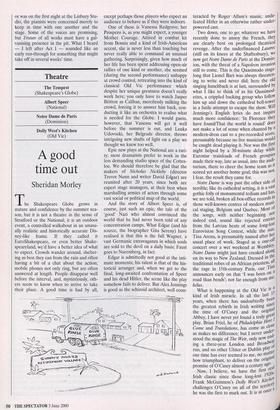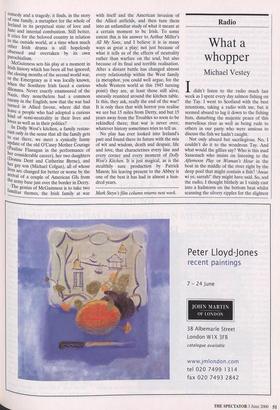Theatre
The Tempest (Shakespeare's Globe) Albert Speer (National) Notre Dame de Paris (Dominion) Dolly West's Kitchen (Old Vic)
A good time out
Sheridan Morley
The Shakespeare Globe grows in stature and confidence by the summer sea- son, but it is not a theatre in the sense of Stratford or the National; it is an outdoor event, a controlled walkabout in an unusu- ally realistic and historically accurate Dis- ney-like frame. If they called it EuroShakespeare, or even better Shake- speareland, we'd have a better idea of what to expect. Crowds wander around, shelter- ing as best they can from the rain and often having a bit of a chat about the action; mobile phones not only ring, but are often answered at length. People disappear well before the interval, and, mysteriously, oth- ers seem to know when to arrive to take their place. A good time is had by all, except perhaps those players who expect an audience to behave as if they were indoors.
One of these is Vanessa Redgrave; her Prospero is, as you might expect, a younger Mother Courage. Attired in combat kit from Bosnia and a kind of Irish-American accent, she is never less than touching but never really able to command an unusual gathering. Surprisingly, given how much of her life has been spent addressing open-air rallies of one kind or another, she seemed (during the second performance) unhappy at crowd control, retreating into the kind of classical Old Vic performance which despite her unique greatness doesn't really work here; you only have to watch Jasper Britton as Caliban, mercilessly milking the crowd, forcing it to answer him back, con- ducting it like an orchestra to realise what is needed for the Globe. I would guess, however, that Vanessa will get it well before the summer is out, and Lenka Udovocki, her Belgrade director, throws intriguing new shafts of light on a play we thought we knew too well.
Epic new plays at the National are a rari- ty; most dramatists prefer to work in the less demanding studio space of the Cottes- loe. We should therefore be glad that the makers of Nicholas Nickleby (director Trevor Nunn and writer David Edgar) are reunited after 20 years, since both are expert stage managers, at their best when marshalling armies of actors through some vast social or political map of the world.
And the story of Albert Speer is, of course, just such an epic, the tale of the `good' Nazi who almost convinced the world that he had never been told of any concentration camps. What Edgar (and his source, the biographer Gita Sereny) have realised is that this is the full Wagner, a vast Germanic extravaganza in which souls are sold to the devil on a daily basis; Faust goes to Nuremberg, in fact.
Edgar is admittedly not good at the inti- mate moments; his talent is that of the his- torical arranger and, when we get to the final, long-awaited confrontation of Speer and his dead Hitler, the scene like the play somehow fails to deliver. But Alex Jennings is good as the schizoid architect, well coun- teracted by Roger Allam's manic, unde- feated Hitler in an otherwise rather under- powered cast.
Two down, one to go: whatever we have recently done to annoy the French, they are clearly bent on prolonged theatrical revenge. After the underfinanced Lautrec (still on its knees at the Shaftesbury), we now get Notre Dame de Paris at the Domin- ion, with the threat of a Napoleon invasion still to come. This is the Quasimodo singa- long that Lionel Bart was always threaten- ing to write and never did; here the old singing hunchback, is at last, surrounded by what I like to think of as his Quasimod- ettes, a crippled backing group who follow him up and down the cathedral bell-tower in a futile attempt to escape the show. Will Jennings's English lyrics do not inspire much more confidence: 'In Florence they have found/That the world is round' does not make a lot of sense when chanted by a modern-dress cast to a pre-recorded score, presumably because no live musician would be caught dead playing it. Nor was the first night helped by a 30-minute delay while Eurostar trainloads of French groupies made their way, late as usual, into the audi- torium, there to cheer the home team as it scored yet another home goal; this was not I fear, the result they came for. Notre Dame is way past the other side of terrible; like its cathedral setting, it is a vast gothic folly of monumental tedium and has, we are told, broken all box-office records in those well-known centres of modern musi- cal staging, Belgium and Quebec. Most of the songs, with neither beginning Or indeed end, sound like rejected entries from the Latvian heats of some long-lost Eurovision Song Contest, while the star, Tina Arena, is presumably named after her usual place of work. Staged as a one-on concert over a wet weekend at Wembley Notre Dame might just have creaked along on its way to New Zealand. Dressed in the traditional robes of an African priestess, all the rage in 15th-century Paris, our Tina announces early on that 'I was born 011 3 road than bends'; not far enough from me, helas.
What is happening at the Old Vic is kind of Irish miracle. In all the last i3 years, when there has undoubtedly been the greatest rebirth in Irish writing sin a1 the time of O'Casey and the origin 1 Abbey, I have never yet found a truly great play. Brian Friel, he of Philadelphia Here Come and Translations, has come as close as makes no difference; but I never under: stood the magic of The Weir, only now end ing a three-year London and Broadway f run, and no other Ulster or Dublin play or our time has ever seemed to me, no matte how triumphant, to deliver on the origin promise of O'Casey almost a century agn'„i Now, I believe, we have the first re:" Irish classic since those long-lost 1921/;; Frank McGuinness's Dolly West's Kite°, challenges O'Casey on all of the terriro% he was the first to mark out. It is at once comedy and a tragedy; it finds, in the story of one family, a metaphor for the whole of Ireland in its perpetual state of love and hate and internal combustion. Still better, it cries for the beloved country in relation to the outside world, at a time when much other Irish drama is still hopelessly obsessed and overtaken by its own parochialism.
McGuinness sets his play at a moment in Irish history which has been all but ignored; the closing months of the second world war, or the Emergency as it was locally known, when the Southern Irish faced a curious dilemma. Never exactly enamoured of the Nazis, they nonetheless had a common enemy in the English; now that the war had turned in Allied favour, where did that leave a people who had adopted a curious kind of semi-neutrality in their lives and loves as well as in their politics? In Dolly West's kitchen, a family restau- rant only in the sense that all the family gets to eat there, we meet a cynically funny update of the old O'Casey Mother Courage (Pauline Flanagan in the performance of her considerable career), her two daughters (Donna Dent and Catherine Byrne), and her gay son (Michael Colgan), all of whose lives are changed for better or worse by the arrival of a couple of American GIs from the army base just over the border in Derry. The genius of McGuinness is to take two laminar themes, the Irish family at war with itself and the American invasion of the Allied airfields, and then turn them into an unfamiliar study of what it meant at a certain moment to be Irish. To some extent this, s his answer to Arthur Miller's All My Sons, and I believe it is in many ways as great a play; not just because of what it tells us of the effects of neutrality rather than warfare on the soul, but also because of its final and terrible realisation. After a distant battle has changed almost every relationship within the West family (a metaphor, you could well argue, for the whole Western world at this 1945 turning point) they are, at least those still alive, uneasily reunited around the kitchen table. Is this, they ask, really the end of the war? It is only then that with horror you realise we are but 15 miles from Derry, and but 15 years away from the Troubles so soon to be rekindled there; that war is never over, whatever history sometimes tries to tell us.
No play has ever looked into Ireland's past and found there its future with the mix of wit and wisdom, death and despair, life and love, that characterises every line and every corner and every moment of Dolly West's Kitchen. It is just magical, as is the stealthily sure production by Patrick Mason; his leaving present to the Abbey is one of the best it has had in almost a hun- dred years.






































































 Previous page
Previous page